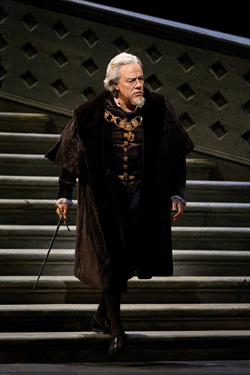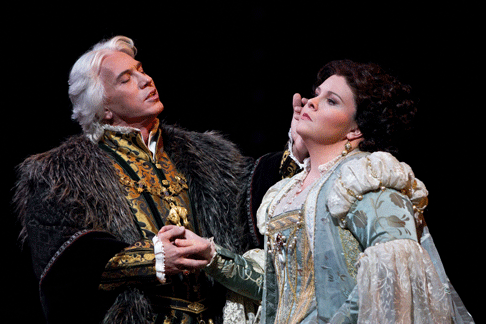Verdi introduces his
guests, his fantastical characters, one by one, each with an aria-and-cabaletta
construct, each on his or her entrance: “This is Ernani, the delinquent
hothead in love; this is Elvira, who loves him back but is being forced to
marry her uncle; this is the king, Don Carlo, a youthful rouÈ”—but
these warbles do not show them at their best. For one thing, none of them are
comfortable on stage yet. They’ve only just arrived; it is cruel to
expect flawless vocal feats the instant they appear, and these entrances,
however well known, were nobody’s best music-making on the present
occasion. Nor do these arias show Verdi at his best—as with any
good host, he thrives on interaction, confrontation, agreement and disagreement
among the proper mix of company. Only when the “guests” have begun
to mill around the story, sample the hors d’oeuvres and reveal
their souls (however slight those turn out to be) do we get the duets and trios
and ensembles, the friction, the conflict, the harmony of a great occasion.
Verdi would learn, in time, to present his characters without bringing them
forward, to let us learn who they are in the course of an act or two, to let
them surprise us.
 Ferruccio Furlanetto as de Silva
Ferruccio Furlanetto as de Silva
Verdi was a discriminating reader of plays, with an eye for
“situations” and thrilling dramatic complexities, stories to which
music would add a layer of thrill, pieces that were “musicable”
(musicabile). This is a lesson American composers who attempt to make
operas of untheatrical novels (Great Gatsby, American
Tragedy) have foolishly ignored. Ernani, Verdi’s fifth
opera and third great success is based on Victor Hugo’s hyperromantic
assault on French classicism, which was right down the composer’s street,
a breath of tuneful fresh air at gale force after the inane Solera poems he had
been obliged to rescue hitherto (Nabucco, Lombardi). With
Ernani, which was also his first collaboration with the librettist
Piave who would give him Rigoletto and Traviata, Verdi had a
stage-story whose every erratic twist and turn takes place right before our
eyes. Hugo’s Hernani may seem ludicrous today, but its ludicrous
actions are governed by logic; they build from their premises to a foredestined
course, and the prime movers are the four principal characters, not ancient
legends, hidden documents or offstage side plots. As Gabriele Baldini remarked,
in his quirky study of Verdi’s operas, Ernani is a mating dance
about three males each trying to chase off their rivals to get the girl to
themselves. You can see walrus perform this sort of thing in the Arctic every
year, with somewhat less bel canto line in their wails.
There is a grandeur even to what is farcical here, as there is in so much
stage murder for honor and revenge. The codes of Passion, Honor and Vendetta
were no longer fashionable in the urban circles of Italy, but their aroma
lingers in the Mediterranean heart (and other regions then chic, such as
Scott’s Scotland or, later, our Wild West); these feelings are too basic
to us, howevermuch deplored—most law codes and ethical religions deplore
Vendetta, and most believers pay lip service to that condemnation, if little
more. The audience for Ernani when it was new, in 1844, could deplore
the egotism of the characters but they were viscerally stirred by Hugo’s
doomed love quadrangle. Like Wagner’s Tristan und Isolde, these
people love more intensely than any real, sane people could in the mundane
world where there are taxes to pay and housework to get done. Their love is
beyond such quotidian matters. They love so much that they cannot live.
To perform Ernani correctly, all you need, as Caruso said of
Trovatore, is the four best singers in the world—though the
singers this time are not S-A-T-B but S-T-Bt-Bs. As in Trovatore, they
should know how to sing Italian music properly (a given in Caruso’s day,
not in ours), and be willing to howl it as if nothing in their lives was more
important than reaching that top note and holding it forever without
(apparently) taking a breath. Such matters can no longer be taken for granted.
The current Metropolitan Opera revival rates a solid B for effort and
achievement. Certainly acting and staging recalled the pre-modern age. Would
you want to see a “Regie-theater,” Catalan or Germanic,
quasi-pornographic Ernani? What on earth would it look like? As
hideous as the Met’s last four Trovatores, probably. The opulent
Samaritani sets for Ernani, with their miles of fine fabric and grand
staircases dashing about in all directions, recall the luxe of castles in
sixteenth-century Spain or opera houses a hundred years ago.
So did the Met have the best singers in the world on this post-Caruso,
post-Ponselle, post-Siepi occasion? And did they sing as though their lives
depended on it? I cannot say they were, or that they did. A solid B, which
nowadays may be the best anyone can expect for blood-and-thunder Verdi.
 Dmitri Hvorostovsky as Don Carlo and Angela Meade as Elvira
Dmitri Hvorostovsky as Don Carlo and Angela Meade as Elvira
Roberto Di Biasio, a young tenor from Catania, Bellini’s home town,
has a lithe, attractive voice, flexible and gracious, and he sings with passion
when passion is called for—a major factor in Ernani. He does
not have—or on this occasion was too nervous to
attempt—the high C’s that can bring an opera house to its feet. He
gave great pleasure without arousing enthusiasm. He is a slim, stalwart stage
figure and struck whatever poses were called for from him.
Elvira was written for Sofia Loewe, later Verdi’s first Odabella in
Attila and his original choice for Lady Macbeth; she must have been
one hell of a singer, with extraordinary range and technique. Angela Meade made
her stage debut in this role, replacing an indisposed Sondra Radvanovsky. On
that occasion the debutante was naturally tentative, and she is not a born
actress, but by the conclusion of that first performance it was clear she had
chosen the right profession. Since that time she has commendably devoted
herself to improving on her weaknesses. Today, she is a local favorite
beginning to be more widely known, and she has Norma and
Semiramide and Virginia under her belt—not to mention
three Anna Bolenas at the Met last fall. She has had time to rethink
Elvira, to recalculate the role’s tempo.
Her rich chest voice though not precisely certain of pitch in “Ernani,
involami,” rose to that feature of her sound that her fans most admire,
the detached head voice for personalized ornamentation, here expressing
(perhaps) ethereal daydreams of true love. This lightness above the staff, this
softness where so many sopranos are strident, is indeed delightful and Meade is
wise enough not to overdo it, but it’s only fair to add that in the bel
canto era, perfect evenness from top to bottom rather than separate voices was
the ideal. Those sweet, pure notes ravish us and Meade has found ways to make
them dramatically effective, but it has always seemed to me that her chest
voice, the necessary base of a true Verdi soprano, is potentially her greatest
resource. How long has it been since an Aida sang her duets with passion and
could float high C’s? Meade may evolve into such a singer, a genuine
spinto, and if she does the Verdi repertory will be hers to command.
Just sayin’.
Don Carlo, Spain’s and America’s Charles the First, Rome and
Germany’s Charles the Fifth (and Burgundy’s Charles the Second,
lest we forget), should be a baritone of regal elegance and adolescent fervor
as well as, at the last (Act III—he’s de trop for the finale),
imperial force. Such baritones once abounded, and those were golden ages for
Verdi’s operas; they may not exist today. Dmitri Hvorostovsky has the
elegance and the dignity, and his voice is very lovely, but one thing they
didn’t teach him in Siberia was how to sing an Italian line. He
can sing many, but he cannot get from one phrase to another without a
painfully audible gasping for breath, and this has always undercut the pleasure
of his singing for me. He does not seem to encounter this problem in smaller
opera houses (Houston, for example) or in the Russian repertory (Queen of
Spades, War and Peace), but at the Met he is not a Verdi baritone
to rank with Merrill, Warren, Bastianini, MacNeil or Milnes. (You see? We did
have them once.) He made many gorgeous sounds on the present occasion, and many
huffs and puffs between them.
Ferruccio Furlanetto, who has been singing everything from Mefistofele to
MephistophÈlËs to Boris Godunov lately, took on the role of Silva, the
honorable foe of young love. This can be a rewarding role for singers in easy
command of the extremes of a basso cantante; Silva postures nobly and Verdi
subscribes to his noble postures. Basses with self-knowledge or a belief in
anything outside themselves lay in Verdi’s future, but Sparafucile, the
first of those, was still seven years away. Furlanetto gave much pleasure but
he is beginning to gasp between lines in a manner learned, perhaps, from
Hvorostovsky.
Once the four characters have been introduced, we get down to business with
the confrontational duets, trios and rousing ensembles that are Verdi’s
natural element. All our singers were palpably delighted at the change, and all
of them sang better than they had on first entrance. The evening rollicked
along, staircase following staircase in the mazy sets. The acting remained
stiff, but … it’s early Verdi; no one expects naturalism.
“The trio,” Verdi told librettist, Piave, “should be the
greatest number in the opera,” and so it is, as well as the last one. And
while the coronation scene made a superb climax to Act III, that Act IV trio
with Meade, Di Biasio and Furlanetto swept memory aside and could have gone on
all night. The Ernani engine must be cranked like a tin Lizzie, but
when it takes off, it’s a Lamborghini. The singers took the curves on two
wheels and crossed the flags like winners.
One annoying bÍtise of the Met production when it was new has been
corrected. The double aria, “Odi il voto, il grande Iddio,” was
inserted into the conclusion of Act II six months after Ernani’s
premiere for the Russian tenor Ivanoff, at Rossini’s personal request. It
intrudes on Hugo’s plot for no reason at all and muddles Verdi’s
beloved dramatic momentum. The aria belongs in recitals (and on recital disks)
when a tenor wants so show off in isolation, but the Met inserted it for this
production because Luciano Pavarotti was the focal point around which the
staging was created, and Pavarotti was an excellent motive so do so: For one
thing, he could sing it, even after a previous double aria and any number of
duets and ensembles. When the Met last brought this production back, either the
conductor was too lazy to delete the piece or Marcello Giordani insisted on
having as large a helping of the green stuff (Verdi, I mean) as the Pav had
had: Anyway, sing it Giordani did, and badly he sang it. I am delighted that
wiser heads have prevailed, and Verdi’s Act II is now given in its proper
form, the last words belonging to tenor and bass, united for once—after
all, the baritone has run off with their soprano.
John Yohalem
image=http://www.operatoday.com/ERNANI2448s.gif
image_description=Angela Meade as Elvira and Roberto De Biasio as Ernani [Photo by Marty Sohl courtesy of The Metropolitan Opera]
product=yes
product_title=Giuseppe Verdi: Ernani
product_by=Elvira: Angela Meade; Ernani: Roberto De Biasio; Don Carlo: Dmitri Hvorostovsky; Silva: Ferruccio Furlanetto. Metropolitan Opera chorus and orchestra conducted by Marco Armiliato. Performance of February 10.
product_id=Above: Angela Meade as Elvira and Roberto De Biasio as Ernani [Photo by Marty Sohl courtesy of The Metropolitan Opera]